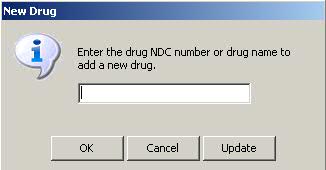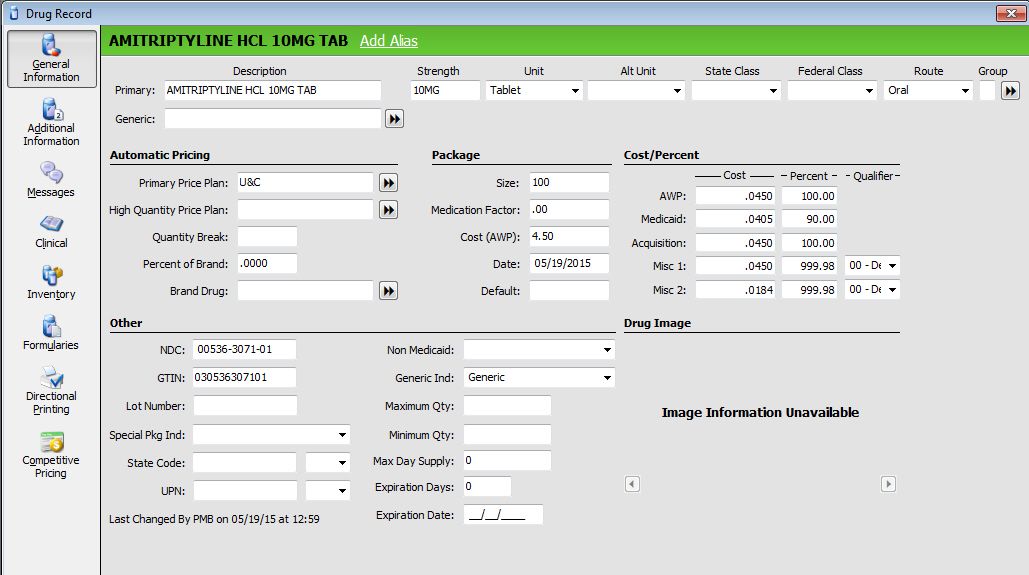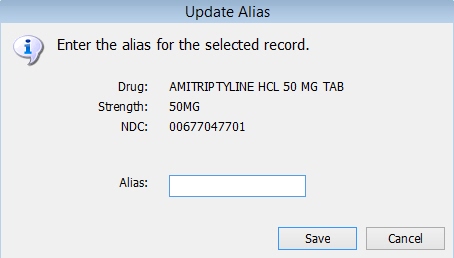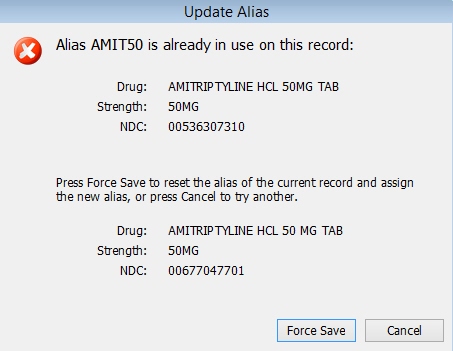There are two ways to add a new Drug Record. It is recommended to always search for a drug before adding it to the system to verify that it is not already entered. One way to search is from New on the menu bar; the other way is from the Search icon on Rx Processing Tasks.
1. Access NRx.
2. Click Search, Drug.
3. Type or scan the drug NDC number or type the drug description to search. Click Find or press ENTER.
4. The Drug Scan displays. If the drug is not in the scan, click ![]() or press CTRL+N
to add the drug.
or press CTRL+N
to add the drug.
5. The New Drug window displays:

6. Type or scan the NDC number or type the drug description. Click OK. If using the drug description as the search criteria, a Drug Record Scan From CD displays. Double-click the drug to add.
7. If you subscribe to Clinical Updates, the Drug Record/General Information screen displays with the drug selected:

8. If you do not subscribe to Clinical Updates, a new blank Drug Record displays.
9. After saving the fields on the General Drug Information screen, the icons on the vertical icon bar become active and additional drug information can be entered on each screen.
10. Use the following definitions to add or edit information in each Drug Record/General Information field as needed.
 The fields marked in Red
are updated via QS/1 Price Updates. The fields marked in Purple
are updated via your wholesaler if Loading
Wholesaler Acquisition Price Updates. Otherwise, they are updated
by QS/1 Price Updates.
The fields marked in Red
are updated via QS/1 Price Updates. The fields marked in Purple
are updated via your wholesaler if Loading
Wholesaler Acquisition Price Updates. Otherwise, they are updated
by QS/1 Price Updates.
| DRUG RECORD/GENERAL INFORMATION | |
| Field Name | Field Definition |
| Primary | Type the drug name, strength and unit. |
| Generic | If the drug is routinely substituted, click the double arrows and select the generic from the scan. |
| Strength | Type the drug strength (up to 10 characters) if the third party billing form has a separate block for the drug strength. |
| Unit | Select the dosage form of the drug from the drop-down list. |
| Alt Unit | Select the alternate dosage from the drop-down list to print on multiple ingredient labels for Customized Label Routine 356. Use Routine 329 to print the Alt Unit from the Drug Record. |
| State Class | Select the state drug class from the drop-down list. |
| Federal Class | Select the federal drug class from the drop-down list. |
| Route | Select the route of administration for the drug from the drop-down list. |
| Group | Type the user-defined code used to group like drugs (generic, birth control, insulin, etc.). Click the double arrows to select a drug group from the from the Drug Group Table scan. |
| Automatic Pricing | |
| Primary Price Plan | If
Automatic Rx
Pricing is checked in Store
Control/Store Level Options/Pricing, the following rules apply:
If Update Rx with New Price Plan is checked in Store Level Options/Pricing, the following rule applies:
|
| High Quantity Price Plan | Type the Price Plan to apply when a high quantity of the drug is dispensed. Type the high quantity amount in the next field. |
| Quantity Break | Type the amount to begin applying the High Quantity Price Plan. |
| Percent of Brand | Optional entry for pricing a generic drug. Type the percentage of the brand name drug cost to calculate the cost of the generic. Select the Brand Drug in the next field. |
| Brand Drug | Click the double arrows and select the brand drug from the scan. This drug is used to calculate the Percent of Brand entered in the field above. |
| Package | |
| Size | Type the size of the item in dispensing units. |
| Medication Factor | This field is used in conjunction with the Use Med Factor field on the 1500 Form Billing Options screen. If Y is typed in this field, the systems uses the Med Factor from the Drug Record to calculate billing quantities for the 1500 Form. If the Med Factor is a number other than zero, the system divides that number into the prescribed quantity. Example: Type 50 in this field for a box of 50 Glucose strips to bill for one (1) box of strips. |
| Cost (AWP) | The wholesale price of the drug. |
| Date | System-generated entry. Displays the date of the last price increase. |
| Default | Type the number of packages for items, such as injectable medications or Z-paks, with decimal sizes to decrease the need for manual calculations. |
| Cost/Percent/Qualifier | The Percent fields match the percentages entered
in Store Control/Store Level Options/Pricing. These fields may
be changed manually on individual Drug Records.
Type 999.99 in the percent field to prevent an automatic update to the field. |
| AWP | The Average Wholesale Price of the drug (or the cost used in pricing private prescriptions). |
| Medicaid | The Medicaid cost is the EAC or MAC cost on drugs covered under Medicaid. All other Medicaid costs are based on the AWP. |
| Acquisition | If loading updates from your wholesaler, the Acquisition Percent field is populated with 999.98 to indicate the drug was updated. |
| Misc 1 | If loading updates from your wholesaler, the Misc 1 Percent field is populated with 999.98 to indicate the drug was updated. Select the pricing source from the drop-down. |
| Misc 2 | If loading updates from your wholesaler, the Misc 2 Percent field is populated with 999.98 to indicate the drug was updated. Select the pricing source from the drop-down. |
| Other | |
| NDC | The 11-digit National Drug Code. |
| GTIN | The 12-digit Global Trade Identification Number (identifies manufacturer and product). |
| Lot Number | Type the drug lot number if your state requires that it print on the label. Select Label Routine 421 to print the Lot Number on the label. |
| Special Pkg Ind | Select the packaging form of the drug from the drop-down list. |
| State Code | If your state requires a state-assigned formulary code, type that code in the first position. If the state requires only the NDC on Medicaid Claims, leave blank. Select the code from the drop-down to define the entry in this field. |
| UPN | Nineteen-character number required when billing medical supplies to Medi-Cal. Select the UPN Qualifier from the drop-down. |
| Non Medicaid | If this drug is not reimbursable under the state Medicaid program but has a Medicaid type Price Plan, select the entry to use from the drop-down. |
| Generic Ind | Required field for some third party edit procedures. Select the indicator from the drop-down. |
| Maximum Qty | Maximum quantity a third party allows to be dispensed. |
| Minimum Qty | Minimum quantity a third party allows to be dispensed. If the drug is used in IV pricing, this amount is used when a partial vial is dispensed. |
| Max Day Supply | This field is used to comply with certain state laws which mandate that pharmacies no longer dispense certain drugs (for example, opoids or benzodiazepine) longer than a 30 day supply. |
| Expiration Days | Type a number of days which will override the expiration days entered in Store Control/Store Level Options/Pricing. This field is used for short-term drugs such as reconstituted liquids. Type an expiration in the field below. |
| Expiration Date | Type an expiration date for short-term drugs. |
| Drug Image | |
| Link as Default | First DataBank is supplying QS/1 with more than one drug image for multiple drugs. When a drug has multiple images/imprints, the selected image prints on labels and monographs. The option, Link as Default, displays for drugs that have more than one image/imprint. All available images display on the record and can be accessed by clicking the arrow keys underneath the image. The image/imprint selected at the time of filling becomes the current default on the Drug Record. |
11. Press CTRL+S or click
![]() .
.
12. Click Add Alias to display the Update Alias window:

13. Type an alias (code) for the drug. Adding a user-defined alias eliminates bringing up the Drug Record Scan to locate the drug. When entering a new prescription, type the alias in the Drug field and the drug information automatically populates on the New Prescription processing screen.
14. Click ![]() .
.
15. If the alias typed in the above window is already in the system, the following window displays:

16. Press  to assign the
new alias to the Drug Record. Press
to assign the
new alias to the Drug Record. Press ![]() to type a different alias.
to type a different alias.
17. Click ![]() .
.
Return to Create Drug Records in NRx